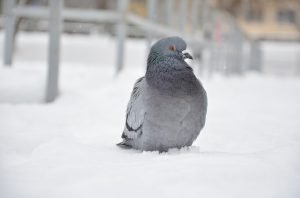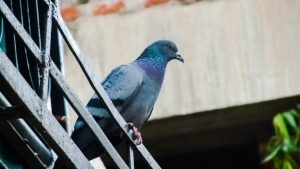There are hundreds of different types of pigeons and doves across the world below we have named those varieties
that rank among the most common and known to the UK. We’ll begin with the broader terminology and groupings for pigeons.
- Size – Large
- Weight – 900g+
- Colour – Predominantly white
- Wild? – No, bred for food
- Lifespan – Varies, typically between 3 – 10 years depending on captivity conditions
- Located – Southern Mexico and Central America
King pigeons are specifically bred for food for us to eat. They are one of the largest species of pigeon but they are very unlikely to fare well in the wild. King pigeons struggle to fly due to their size and genetic problems caused by excessive breeding. Most king pigeons are bought as pets, as they are very mild-mannered and easy to care for. They are not varied in colour, most of which are blue or white.

Name: Racing and Homing Pigeons
- Size – Medium
- Weight – 200-400g+
- Colour – A variety, but typically blue, similar to wild pigeons
- Wild? – Yes, but can be caught and trained for homing purposes
- Lifespan – Typically between 5 – 15 years depending on environmental factors and breeding
- Located – Columbia (originally) but can be bred almost anywhere

Homing pigeons are similar to domestic pigeons but have a homing ability. Originally derived from rock pigeons, homing and racing pigeons have an in-built homing system that allows them to travel or be taken great distances while being able to remember and return to their original residence. In terms of their colour, there’s not much variety – racing pigeons are simply domesticated pigeons bred and trained for racing.
Name: Fancy Pigeon
- Size – Small to medium
- Weight – 200-400g+
- Colour – A wide variety
- Wild? – No, they are bred for domestic use
- Lifespan – Typically between 5 – 10 years
- Located – Germany
As their names suggests, fancy pigeons are specialised breeds that are bred for several uses. Some people will breed fancy pigeons to showcase at competitions, others may simply breed them to sell or keep as extravagant pets. Fancy pigeons come in many varieties, including pouters, tumblers and owls. Fancy pigeons require high levels of personal upkeep to ensure their coats remain healthy.
Name: Feral Pigeon
- Size – Small to medium
- Weight – 300-500g+
- Colour – Usually blue with a hint of purple
- Wild? – Yes, derived from rock pigeons
- Lifespan – Typically between 5 – 10 years depending on several environmental factors
- Located – All over the UK
By far the most common type of pigeon, feral pigeons can be found throughout the UK, dominating many of our busiest towns and cities. Originally derived from rock and cliff pigeons, they have swiftly adapted to our urban way of living and thrive in our communities.
Despite not causing any immediate threat to our way of living, feral pigeons can cause a number of problems in larger numbers – not least health concerns. Crowding, pigeon droppings and hygiene are among the main concerns, problems that our team at Safeguard deal with on a daily basis.
Name: Band-tailed Pigeon
- Size – Medium, longer than other pigeons
- Weight – 400-600g+
- Colour – Grey with a white band across the back of their head
- Wild? – Yes
- Lifespan – Typically between 5 – 12 years
- Located – North America
This type of pigeon gets their name from their long, often grey banded tail. They’re slightly taller than the average feral pigeon and most have a distinguishable white band on the back of their neck. They typically live in forests and woodlands (much like wood pigeons) and are very rarely seen in urban environments (unlike feral pigeons). Their diet revolves around foods they forage in the woodlands; berries, nuts and small insects being core inclusions.
Suffering from Pigeon Problems?
If you find that pigeons are causing a problem in your home or commercial property, Safeguard can help. We specialise in providing humane pigeon removal and deterrent services across the UK. For all pigeon and problem bird-related issues, contact Safeguard today.
FAQs
Pigeons are renowned as one of the most intelligent bird species on the planet. Pigeons can be trained to deliver messages, race for sport and even save lives at sea. They typically fall behind in the intelligence scale, however, to ravens and crows.
Pigeons were originally found in Europe, North Africa and parts of Western Asia. Now, pigeons can be found across multiple continents and have a projected population of around 15 – 30 million in Europe.
Pigeons, like crows, are thought to be able to remember faces, especially if they are harmed by that person. Like crows, pigeons seem able to remember different faces, regardless of whether the person changes their clothing.
Pigeons have an innate homing ability that allows them to retrace their flight path and return to their nest. Scientists believe this is because they can sense the Earth’s magnetic fields. No matter how much you shoo a pigeon, they will be able to find their way home. The only way you can successfully relocate a pigeon is through a structured process carried out by pest control experts.

